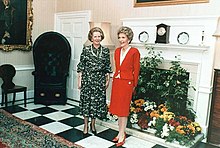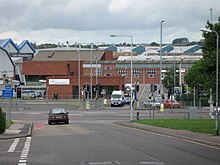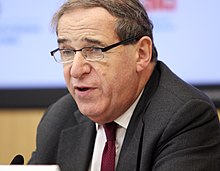Westland Affair
The Westland Affair was an internal political dispute between the conservative Prime Minister Margaret Thatcher and cabinet member Michael Heseltine from late 1985 to mid-1986. The reason for the dispute was the future of the only British helicopter manufacturer, Westland Helicopters , which had run into economic difficulties . While Defense Minister Heseltine preferred a takeover of the company by a European consortium, Thatcher had supported the vote of the company managers and preferred a cooperation with the American Sikorsky Aircraft Corporation . In the course of the Westland affair became increasingly public and caused Thatcher's reputation serious political damage. As a result, Heseltine resigned from his post. Thatcher's henchman Leon Brittan also had to resign from his cabinet post after it was revealed that he leaked a dossier to the press in an attempt to undermine Heseltine's position. As a result, Thatcher had to survive a critical debate in the House of Commons.
Political background
In office since 1979 , Margaret Thatcher's government was re-elected by a large majority in 1983 . Afterwards she initiated numerous domestic political reforms, some of which were controversial, and with the miners' strike that her government successfully ended, the power of the English trade unions was broken in the long term. In mid-1985 her authority seemed unchallenged.
Michael Heseltine had studied at Oxford and had become a millionaire as a publisher before moving into politics. Appointed Secretary of the Environment in Thatcher's first administration in 1979 , Heseltine was promoted to Secretary of Defense in January 1983. He had recommended himself both as a verbose speaker and as an effective minister at conservative party congresses. However, there were different political views between Thatcher and Heseltine. Heseltine was by his basic attitude europhile and known as a conductor. Thatcher, instinctively pro-American, distrusted Heseltine because of his preferentially interventionist economic policy, which had never been committed to her economic policy ideals , and saw him as a potential rival for a long time. However, she never felt strong enough to dismiss Heseltine from the cabinet. Conversely, the flamboyant Heseltine was known as a very ambitious politician, whose stated goal was to become prime minister himself. As Secretary of Defense, Heseltine had fought hard to get part of a large naval contract to go to Merseyside and vigorously defied Thatcher's original idea with success. After that, in the opinion of Chancellor Nigel Lawson , Thatcher was all the more determined to put Heseltine in place at the earliest opportunity. Conversely, on various political issues, Heseltine was increasingly dissatisfied with the line that Thatcher's government was taking. In October 1985 an article in The Sunday Times predicted that Heseltine was heading for a spectacular resignation.
Situation of Westland Helicopters in 1986
In the 1980s, the Westland Helicopters company got increasingly into economic difficulties and was unprofitable. Although the overall business volume was insignificant, the company was the only British manufacturer of helicopters for the British military and was therefore of political relevance. Alan Bristow, founder of Bristow Helicopters, offered to take over Westland. In return, however, he demanded clear guarantees from the British Ministry of Defense about future orders for Westland. In June 1985 he withdrew his takeover offer. Sir John Cuckney then became the new chairman of Westland and suggested that a partner take a 29.3% stake in the company in order to provide Westland with much-needed fresh capital. However, no British investor was subsequently found for the project. The American United Technologies Corporation , to which the Sikorsky Aircraft company also belonged, has now submitted an offer for Westland.
Course of the affair

In mid-October, Heseltine then proposed a European consortium consisting of the French company Aérospatiale , the Italian Agusta and the German company Messerschmitt-Bölkow-Blohm . Westland's board of directors (supported by Thatcher and parts of the cabinet), however, voted in favor of the American offer in November. Nevertheless, Heseltine pushed the cooperation with the European consortium led by the Italian Agusta. Leon Brittan was also directly involved in the dispute because, as Minister for Trade and Industry, he was responsible for approving the takeover. In early December 1985, there were several ad hoc Cabinet members meeting to review Heseltine's proposals. These discussions ended in a draw, with the majority voting for Westland's board to rule. However, Heseltine was given time until December 13 to propose a promising offer from a consortium for Westland, whereupon he proposed a consortium in which British Aerospace was now also involved. However, this was also rejected by the Westland board. On December 16, Leon Brittan announced in the House of Commons that the decision would be left to the Westland board. This was discussed and approved for a few minutes in the cabinet three days later. In addition, Heseltine was asked to stop its efforts for a European takeover.
However, Heseltine did not accept this and continued to insist that the matter be presented in full to the entire cabinet. He now endeavored to put the dispute in a broader context and portrayed it as a struggle between his pro-European approach and Thatcher's Americanism. In addition, a memorandum from Heseltines was published in which Heseltines had compiled information stating that Westland would no longer receive any European contracts in the event of a takeover by Sikorsky. During the Christmas break, the British media increasingly took up the dispute in the cabinet. Thatcher discussed the possibility of dismissing Heseltine with confidants, who had presented himself as disloyal in their eyes. However, for tactical reasons she did not dare to fire Heseltine. However, a critical official dossier from the Crown Attorney, intended to undermine Heseltine's position, surfaced in the press.
The spirited Heseltine, who found himself increasingly isolated in the Cabinet, stormed out of the Cabinet room at a Cabinet meeting on January 9, 1986 after he had been harshly attacked by Thatcher and the staunch Thatcherist Nicholas Ridley . Shortly afterwards he published a detailed memorandum in which he announced his resignation and spoke of a complete collapse of joint cabinet responsibility. A little later, in the House of Commons, Heseltine again lamented the collapse of the cabinet's collective responsibility.
As a result, Thatcher's henchman Leon Brittan had to resign from the post of Minister of Commerce and Industry after it became known that the critical dossier came from his ministry. He said he was acting at the request of Thatcher's closest advisers, Charles Powell and Bernard Ingham. Thatcher himself claimed that he had been clueless about the puncture of the dossier to the press.
In the House of Commons, Thatcher had to survive a critical debate and fend off several attacks on her personal integrity. She stuck to her line, which had already been publicly presented before, and denied that she had previously known about the dossier leaked to the press from Brittan's Ministry. The opposition leader Neil Kinnock (Labor) did not manage to bring Thatcher into a decisive distress or to prove a lie to her. Heseltine, who did not want to appear disloyal, showed himself loyal to the government in the debate and attacked opposition leader Neil Kinnock. He declared the matter closed and voted for Thatcher's administration in the Labor-appointed vote of confidence.
consequences
The Westland Affair seriously damaged Thatcher's public image. She exposed her authoritarian and sometimes disparaging dealings with her cabinet colleagues. For the first time since 1982 it appeared vulnerable. In addition, the media now also took up Thatcher's authoritarian style of government as a topic, which was in stark contrast to the ideal of collective responsibility of earlier cabinets, as it had been established at the beginning of the 20th century. The regular piercing of information practiced by her inner circle in order to undermine Thatcher's political opponents also became the subject of critical coverage in the British media.
Michael Heseltine retired to the back seats; for the duration of the 1987 election campaign , he loyally supported Thatcher's government, after which he became a challenger on hold for them. Financially independent, he could afford to start a private campaign, to travel the country and visit many of the local conservative party organizations to restore his tarnished reputation. Four years later, he challenged the now politically weakened Thatcher and ran for chairmanship of the Conservative Party. Although he could not beat her in the party vote, Thatcher also missed the quorum required for her re-election and was forced to resign shortly afterwards due to the lack of support in the cabinet.
literature
- Richard Aldous: Reagan and Thatcher. The Difficult Relationship. Arrow, London 2009, ISBN 978-0-09-192608-3 .
- Robert Blake : The Conservative Party from Peel to Major. Faber and Faber, London 1997, ISBN 0-571-28760-3 .
- John Campbell: Margaret Thatcher: Grocer's Daughter to Iron Lady. Vintage Books, 2009, ISBN 978-0-09-954003-8 (first published in 2003).
- Richard Vinen : Thatcher's Britain. The Politics and Social Upheaval of the 1980s . Simon & Schuster, London 2009, ISBN 978-1-84739-209-1 .
Individual evidence
- ^ Richard Vinen: Thatcher's Britain. The Politics and Social Upheaval of the 1980s . Simon & Schuster, London 2009, p. 265.
- ^ Robert Blake: The Conservative Party from Peel to Major. Faber and Faber, London 1997, p. 368.
- ↑ John Campbell: Margaret Thatcher. Volume Two: The Iron Lady . Vintage Books, London 2008, p. 483.
- ↑ John Campbell: Margaret Thatcher. Volume Two: The Iron Lady . Vintage Books, London 2008, p. 483.
- ↑ John Campbell: Margaret Thatcher. Volume Two: The Iron Lady . Vintage Books, London 2008, p. 485.
- ↑ Richard Aldous: Reagan and Thatcher. The Difficult Relationship . Arrow, London 2009, p. 201.
- ↑ Richard Aldous: Reagan and Thatcher. The Difficult Relationship . Arrow, London 2009, p. 201.
- ^ Richard Vinen: Thatcher's Britain. The Politics and Social Upheaval of the 1980s . Simon & Schuster, London 2009, p. 266.
- ↑ John Campbell: Margaret Thatcher. Volume Two: The Iron Lady . Vintage Books, London 2008, p. 485 f.
- ↑ John Campbell: Margaret Thatcher. Volume Two: The Iron Lady . Vintage Books, London 2008, p. 486.
- ↑ John Campbell: Margaret Thatcher. Volume Two: The Iron Lady . Vintage Books, London 2008, p. 487.
- ^ Robert Blake: The Conservative Party from Peel to Major. Faber and Faber, London 1997, p. 369.
- ↑ John Campbell: Margaret Thatcher. Volume Two: The Iron Lady . Vintage Books, London 2008, p. 488.
- ↑ John Campbell: Margaret Thatcher. Volume Two: The Iron Lady . Vintage Books, London 2008, p. 490 f.
- ↑ Michael Crick: Michael Heseltine: A Biography. Hamish Hamilton, London 1997, p. 283 ff.
- ↑ John Campbell: Margaret Thatcher. Volume Two: The Iron Lady . Vintage Books, London 2008, p. 493 f.
- ↑ John Campbell: Margaret Thatcher. Volume Two: The Iron Lady . Vintage Books, London 2008, p. 495 f.
- ^ Richard Vinen: Thatcher's Britain. The Politics and Social Upheaval of the 1980s . Simon & Schuster, London 2009, p. 267.
-
↑ John Campbell: Margaret Thatcher. Volume Two: The Iron Lady . Vintage Books, London 2008, p. 737.
Richard Aldous: Reagan and Thatcher. The Difficult Relationship . Arrow, London 2009, p. 273.



